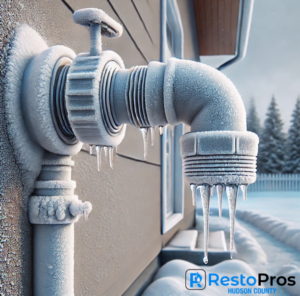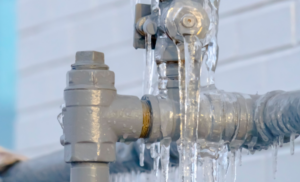Winter brings chilly temperatures and cozy moments, but it can also bring the risk of frozen pipes and water damage to your North Jersey home. When water freezes, it expands, which can cause pipes to burst and lead to costly repairs. However, with proper preparation, you can reduce the risk of frozen pipes and protect your home from winter water damage. Here’s what homeowners need to know to stay ahead of the cold.
Why Frozen Pipes Are a Concern
When temperatures drop below freezing, any exposed or poorly insulated pipes are at risk of freezing. The expansion of water as it freezes can cause pipes to crack or burst, resulting in leaks and significant water damage to your home. This issue is especially common in areas with sudden temperature drops or older homes with less insulation.

Tips to Prevent Frozen Pipes
Follow these steps to protect your pipes and avoid winter water damage:
1. Insulate Your Pipes
Wrap exposed pipes in insulation sleeves or foam to keep them warm during cold weather. Focus on pipes in unheated areas like basements, garages, and crawl spaces.
2. Seal Drafts and Cracks
Check for drafts and seal cracks around windows, doors, and the foundation to prevent cold air from reaching your pipes. Use caulking or weatherstripping to block the cold.
3. Keep Your Home Warm
Maintain a consistent indoor temperature of at least 55°F, even when you’re away. Open cabinet doors under sinks to allow warm air to circulate around plumbing.
4. Let Faucets Drip
Allow a small trickle of water to flow from faucets connected to exposed pipes. This reduces pressure and helps prevent freezing.
5. Disconnect Outdoor Hoses
Disconnect and store garden hoses, and shut off outdoor faucets. Drain any remaining water from the pipes to prevent freezing.
6. Install Pipe Heating Cables
For pipes in particularly vulnerable areas, consider installing pipe heating cables or heat tape. These provide extra warmth and can prevent freezing in extremely cold conditions.
Signs Your Pipes May Be Frozen
Even with precautions, pipes can sometimes freeze. Watch for these signs:
- No water flow when you turn on a faucet.

- Frost on visible pipes.

- Unusual smells coming from drains (caused by a blockage due to freezing).
If you suspect a pipe has frozen, act quickly:
- Turn off the main water supply to prevent leaks if the pipe bursts.
- Use a hairdryer, heating pad, or warm towels to gently thaw the pipe. Never use an open flame.
- Call a professional plumber or restoration company if you cannot locate or safely thaw the pipe.
Protecting Your Home From Water Damage
If a pipe bursts, immediate action is crucial to minimize water damage. Here’s what to do:
- Turn off the water supply immediately.
- Move valuables and furniture away from the affected area.
- Call a water damage restoration company like [Your Company Name] to assess and repair the damage.
Winter Maintenance Checklist
Use this checklist to stay prepared:
- Inspect and insulate exposed pipes.
- Check for drafts and seal cracks around your home.
- Disconnect outdoor hoses and drain outdoor faucets.
- Keep your home warm, even when you’re away.
- Know where your main water shut-off valve is located.
Conclusion
Preventing frozen pipes and water damage during the winter is all about preparation. With a few proactive steps, you can protect your home, avoid costly repairs, and enjoy the season worry-free. If you do experience water damage, contact RestoPros of Hudson County immediately for fast and reliable restoration services. We’re here to help keep your home safe and secure, no matter the season.
